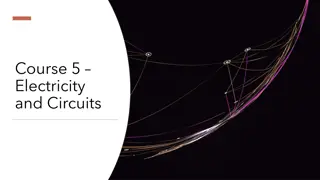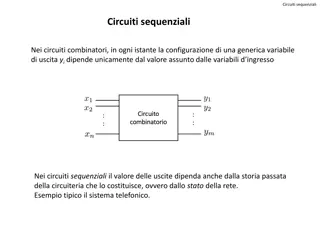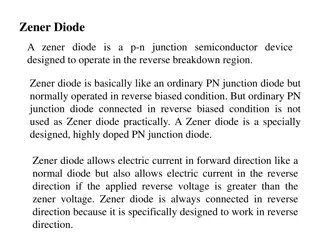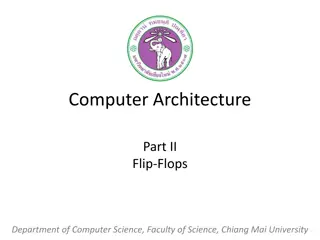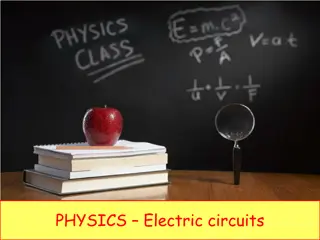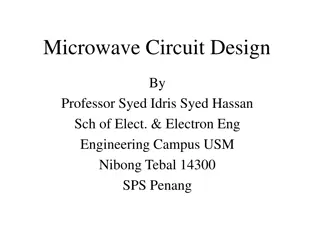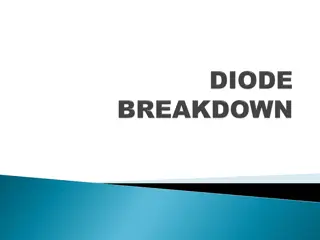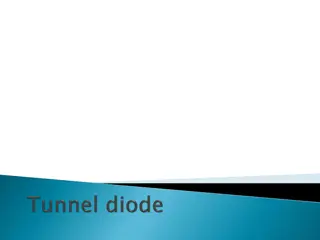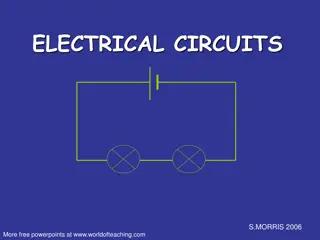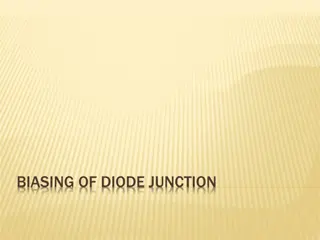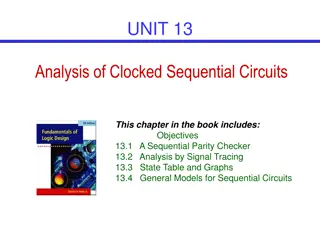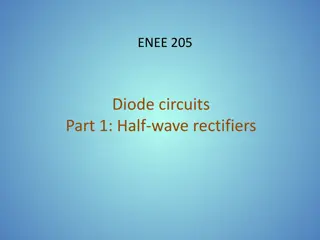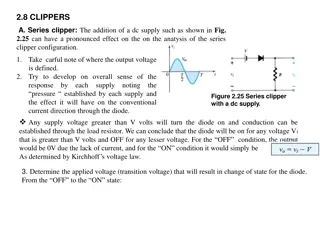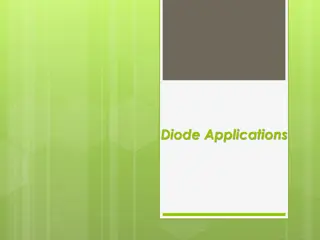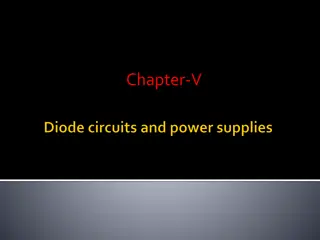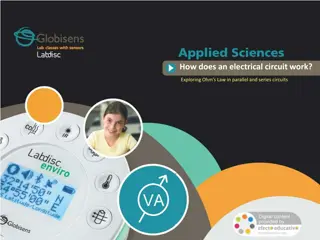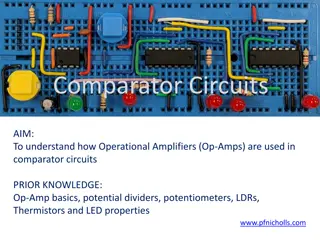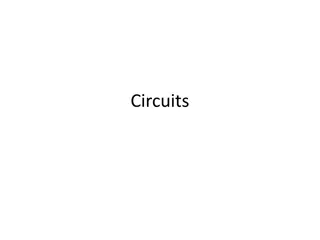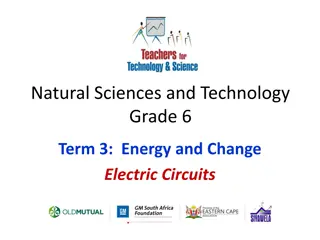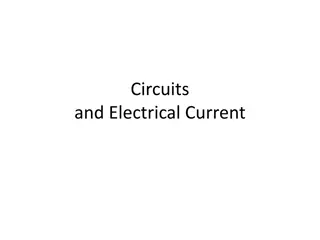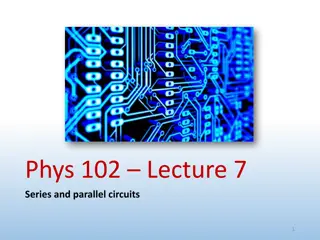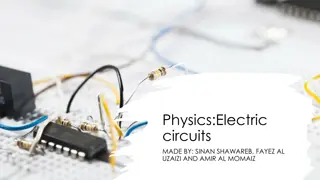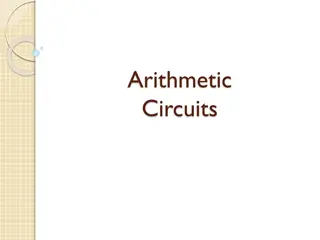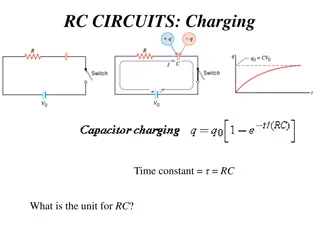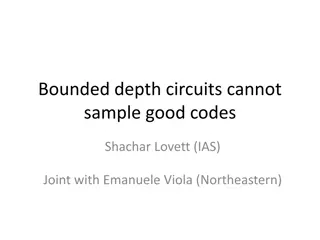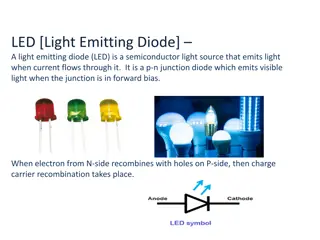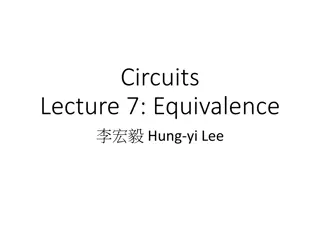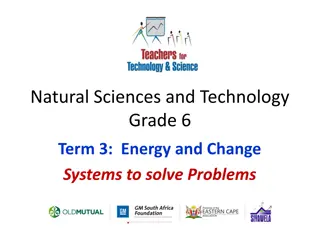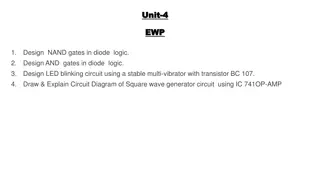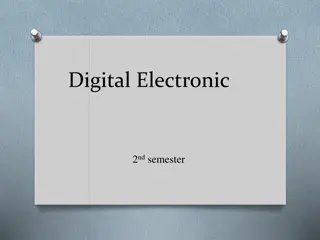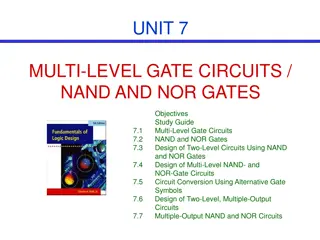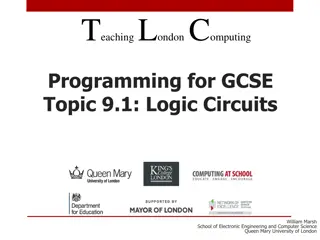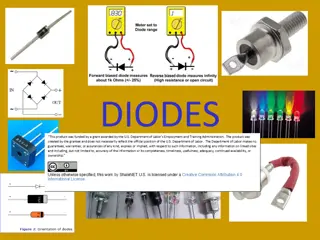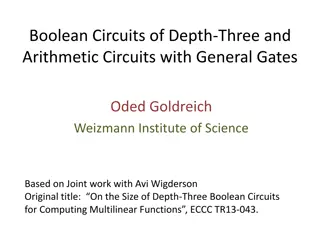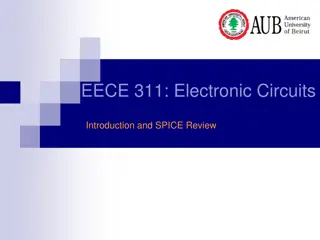Understanding Electricity and Circuits: Basics, Components, and Applications
This educational course covers topics such as circuit symbols, calculating and measuring electrical quantities, identifying circuits, and understanding the relevance of electricity in engineering. It explains essential circuit components like energy sources, conductors, insulators, loads, control de
12 views • 30 slides
Understanding Sequential Circuits: A Brief Overview
Sequential circuits differ from combinational circuits in that the output depends not just on the current input but also on the circuit's past history. This overview covers the basics of sequential circuits, including finite-state automata, states, transitions, and memory elements like flip-flops.
2 views • 50 slides
Understanding Zener Diodes: Breakdown Mechanisms and Symbol
A Zener diode is a specialized semiconductor device designed to operate in the reverse breakdown region, with two types of breakdown - avalanche and Zener. Avalanche breakdown occurs at high reverse voltages in both normal and Zener diodes, while Zener breakdown is specific to heavily doped P-N junc
9 views • 19 slides
Understanding Sequential Logic Circuits in Digital Systems
Logic circuits in digital systems can be either combinational or sequential. Sequential circuits utilize storage elements along with logic gates, where outputs depend not only on present inputs but also on past inputs and internal states. They are essential building blocks, with storage registers pl
5 views • 20 slides
Logic Families
Logic families such as Diode Logic (DL), Resistor-Transistor Logic (RTL), and Diode-Transistor Logic (DTL) each have distinct capabilities and limitations when it comes to performing logic functions. While DL gates are simple and inexpensive but limited in functionality, RTL gates offer both normal
1 views • 22 slides
Understanding Combinational Circuits in Computer Architecture
Combinational circuits in computer architecture play a crucial role in transforming binary information from input data to output data. These circuits consist of logic gates connected in a specific arrangement to process binary data efficiently. Key components such as half-adders and full-adders are
1 views • 48 slides
Comprehensive Guide to Electric Circuits and Circuit Diagram Interpretation
Explore the fundamentals of electric circuits, circuit components, and diagram interpretation. Learn about series and parallel circuits, resistors, sources, switches, transducers, and more. Discover how to calculate resistance, current, and potential difference in circuits. Gain insights into diodes
2 views • 76 slides
Comprehensive Microwave Circuit Design Course Overview
This comprehensive course on Microwave Circuit Design by Professor Syed Idris Syed Hassan covers topics such as transmission lines, network parameters, matching techniques, power dividers, diode circuits, amplifiers, oscillators, filters design, and more. The syllabus includes lectures, simulations,
0 views • 49 slides
Understanding P-N Junction Diodes and Zener Diodes
A normal p-n junction diode allows electric current only in forward biased condition, offering small resistance. When reverse biased, it blocks current. If the reverse biased voltage is highly increased, it can lead to zener or avalanche breakdown. Zener diodes are specifically designed for working
0 views • 19 slides
Understanding Tunnel Diode: A High-Speed Solid-State Electronic Device
Tunnel diode, a heavily doped solid-state electronic device, displays negative resistance due to the phenomenon of Tunneling. It is utilized as a fast-switching component in computers, with germanium being a common material used to manufacture it. The depletion region's width in a tunnel diode is ex
0 views • 15 slides
Understanding Electrical Circuits: Basics and Types
The presentation covers the basics of electrical circuits, explaining the concept of electric current, the role of cells and batteries, simple circuit components like switches and lamps, and circuit diagrams. It further delves into types of circuits - series circuits and parallel circuits, detailing
0 views • 24 slides
Understanding Diode Junction Biasing: Zero and Forward Bias Conditions
In the world of electronics, diode junction biasing plays a crucial role. This article delves into the concepts of zero and forward bias conditions for diodes. When a diode is zero-biased, no external potential energy is applied, while in forward bias, a specific voltage is introduced to initiate cu
0 views • 21 slides
Analysis of Clocked Sequential Circuits and Parity Checkers
This chapter delves into the analysis of clocked sequential circuits, focusing on topics such as sequential parity checkers, signal tracing, state tables and graphs, and models for sequential circuits. It covers concepts like Mealy and Moore machines, state equations, state graphs, timing charts, an
0 views • 38 slides
Evolution of Semiconductor Devices in Modern Electronics
The lecture discusses the fundamentals of semiconductor drift and diffusion currents, diode behavior, transistor characteristics, and amplifier circuits in ECE 255. It explores the origins of modern electronics, from the invention of the bipolar transistor to the evolution of electronic devices thro
0 views • 35 slides
Understanding Diode Circuits: Half-Wave Rectifiers and Full-Wave Rectifiers
Diode circuits play a crucial role in converting AC signals to DC signals. This article covers the basics of diodes, half-wave rectifiers, and full-wave rectifiers. It explains the functioning of unfiltered and filtered rectifier circuits, highlighting the differences in ripple effects and voltage r
6 views • 18 slides
Understanding diode clipper circuits with DC supply impact
Diode clipper circuits, such as series and parallel configurations with DC supplies, have a significant effect on signal analysis. By defining output voltages, determining transition voltages for diode states, and exploring waveform responses, these circuits can be analyzed effectively to understand
0 views • 4 slides
Understanding Diode Applications in Modern Electronic Systems
Diodes are essential semiconductor components with various applications in electronic systems. They allow current flow in one direction, serving as one-way switches. Diodes are used in communication systems, computers, power supplies, televisions, radar circuits, and more. One significant applicatio
1 views • 19 slides
Understanding Diode Circuits and Rectifiers for Power Supplies
Exploring the functionality of diode circuits in series and parallel configurations, along with clippers, clampers, and voltage multipliers. Gain insights into power supplies such as half-wave and full-wave rectifiers, Vrms derivation, Ripple Factor, and more. Learn about diode behavior in rectifica
4 views • 58 slides
Understanding Electrical Circuits and Ohm's Law
Electric circuits play a crucial role in our daily lives, powering various devices and appliances. This activity delves into Ohm's Law in parallel and series circuits, exploring the flow of electric current and the transformation of electrical energy into different forms. Through hands-on experiment
0 views • 31 slides
Understanding Operational Amplifier (Op-Amp) Comparator Circuits
Operational Amplifiers (Op-Amps) are commonly used in comparator circuits to convert analog inputs to digital outputs. In comparator circuits, the Non-Inverting input being higher or lower than the Inverting input determines whether the output is ON or OFF. Real comparators like the 741 or 081 have
1 views • 14 slides
Understanding Circuits: Exploring Requirements, Function, and Analogies
Delve into the world of circuits by learning about their requirements, functions, and different types. Discover how circuits work, their components like bulbs and batteries, and explore analogies like comparing circuits to water parks. Gain insights into the flow of electrons and the essential laws
0 views • 47 slides
Exploring Electric Circuits in Grade 6 Natural Sciences and Technology
Dive into the world of electric circuits with Grade 6 students as they learn about circuit diagrams, different configurations involving cells, bulbs, and switches. The images provide visual examples of circuits with varying components, encouraging students to identify differences and understand how
0 views • 8 slides
Exploring Circuits and Electrical Current: Essential Concepts and Experiments
Dive into the world of circuits and electrical current with a focus on understanding the requirements, components, and functioning of circuits. Explore essential questions, experiment with building circuits, and grasp the basics of how electricity flows through a circuit. Discover the different type
0 views • 54 slides
Electric Circuits: Series and Parallel Configurations Explained
In this lecture on electric circuits, we delve into series and parallel circuits featuring batteries, wires, resistors, and capacitors. Key concepts discussed include Kirchhoff's loop rule, series components, and equivalent resistance and capacitance. Learn how to simplify complex circuits and analy
0 views • 24 slides
Understanding Electric Circuits: Basics and Examples
An exploration of electric circuits, including their components, symbols, and the flow of current. Learn about examples of electric circuits used in devices like televisions and loudspeakers. Test your knowledge with questions on circuit symbols, the definition of an electric circuit, and examples o
0 views • 11 slides
Understanding Combinational Circuits in Digital Electronics
Combinational circuits are an essential component of digital electronics, combining different gates to perform specific functions without memory usage. They provide outputs based solely on present input levels, with no influence from previous states. Types of combinational circuits include half adde
0 views • 55 slides
Applications of RC Circuits in Electronics and Biomedical Devices
RC circuits play a crucial role in various applications such as camera flashes, timing devices in automobiles, and heart pacemakers. These circuits involve charging and discharging a capacitor through a resistor, controlling voltage pulses for precise timing. In devices like camera flashes, the flas
0 views • 7 slides
Lower Bounds on Sampling Good Codes in Bounded-Depth Circuits
Bounded-depth circuits are proven unable to sample or approximate good codes effectively. This work delves into lower bounds, showcasing that bounded families of circuits face limitations in computing specific functions or sampling distributions. The example of Parity in AC0 circuits illustrates the
0 views • 21 slides
Understanding the Efficiency and Applications of LED Technology
A light-emitting diode (LED) is a semiconductor light source that emits light when current flows through it. This technology operates based on charge carrier recombination at a p-n junction diode. LED efficiency is calculated as the ratio of light output to electrical input power. Common application
0 views • 5 slides
Understanding Integrated Circuits: Fabrication and Packaging Technology
Integrated circuits are fabricated on silicon wafers using a photographic process. The resolution of this process determines the number of devices that can be integrated onto a single chip. After fabrication, the wafer is tested, diced, and functional die are packaged using aluminum or gold wires. T
0 views • 11 slides
Understanding Equivalent Networks in Circuits
Explore the concept of equivalent networks in circuits, detailing how they simplify complex circuits, along with comparisons to programming functions. Delve into the parallels between circuit design and programming, highlighting the importance of structuring circuits like functions. Discover the ben
0 views • 50 slides
Understanding Electric Circuits in Grade 6 Science
Explore the world of electric circuits in Grade 6 Natural Sciences and Technology. Learn about components like cells, conductors, light bulbs, and switches. Discover how symbols represent these elements and see examples of circuits with different configurations. Get familiar with crocodile clips for
0 views • 9 slides
Electric Field Distribution in Vacuum Nano-Diode
Growing interest in miniaturization of anode-cathode gap using fine emission tips for vacuum nano-diode applications. This study investigates the effects of finite AK gap on electric field distribution around emission tips, utilizing Schwarz-Christoffel transformation. Insights from this research ha
0 views • 16 slides
Exploring Diode and Transistor Logic Circuits for LED Blinking and Logic Operations
Dive into the world of diode and transistor logic circuits with designs for NAND and AND gates, as well as LED blinking circuits using stable multi-vibrators. Learn how these circuits function and discover the components involved in creating a square wave generator. Explore the practical application
0 views • 9 slides
Introduction to Digital Electronic Circuits and Logic Gates
Understanding digital electronic circuits and logic gates is essential for building digital systems. This content covers the basics of logic gates, digital signals, and the practical application of binary digits in circuits. It discusses the function and importance of logic gates, such as NOT gates
0 views • 17 slides
Design of Multi-Level Gate Circuits Using NAND and NOR Gates
Explore the design and analysis of multi-level gate circuits using NAND and NOR gates, including two-level and multiple-output circuit design. Learn about circuit conversion, alternative gate symbols, AND-OR, OR-AND configurations, and factorization of multi-level gate circuits. Dive into examples a
0 views • 28 slides
Understanding Logic Circuits in Computer Architecture
Explore the world of logic circuits through this comprehensive guide. Learn about logic gates, truth tables, and how computers are built from these components. Discover the basics of logic gates like AND, OR, and NOT, and delve into connecting gates to create functional circuits. Enhance your unders
0 views • 20 slides
Understanding Diodes: Construction, Characteristics, and Applications
Explore the world of diodes through detailed explanations of construction methods, electrical characteristics, and V-I characteristic curves. Learn about forward and reverse biasing, diode applications, and diodes used as rectifiers. Delve into alloyed and diffused junctions, PN junction basics, bar
0 views • 26 slides
Depth-Three Boolean Circuits and Arithmetic Circuits: A Study on Circuit Complexity
Explore the intricacies of depth-three Boolean circuits and arithmetic circuits with general gates, focusing on the size, structure, and complexity measures. The research delves into the relationship between circuit depth, gate types, and multi-linear functions, offering insights into circuit models
0 views • 12 slides
Electronic Circuits Introduction and SPICE Review Course Information
This course, EECE 311, provides an in-depth exploration of electronic circuits, covering topics such as BJT and MOSFET amplifiers, feedback systems, operational amplifiers, oscillators, and digital CMOS circuits. Students will gain knowledge on amplifier characteristics, frequency response, and the
0 views • 8 slides
